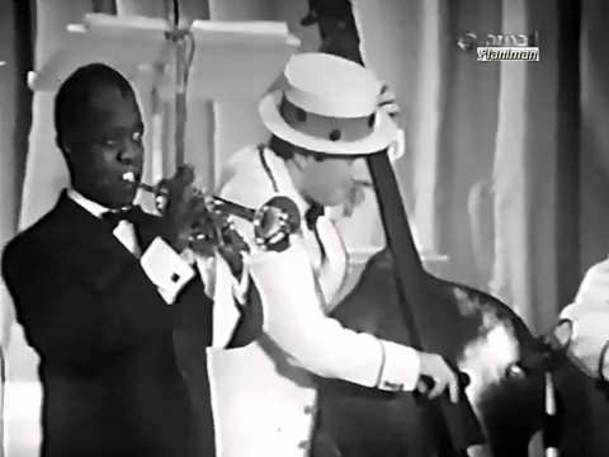


In 1968 someone came up with the idea of inviting Louis Armstrong [2], one of the best and unquestionably most famous jazz musicians to the Sanremo Italian Song Festival [3]. At the time the idea provoked wild reactions, some positive, others not so positive.
Armstrong gained popularity for his uncanny ability to communicate the warmth and emotional fervor of original jazz to audiences. To be clear: Armstrong was playing New Orleans-style jazz. He was also a very good singer. He could make the most trivial songs unforgettable.
At the same time, as a trumpeter and innovator of jazz lingo, Armstrong – known to friends and fans as “Pops” – was a genius. His extraordinary career has always been marked by these two strains. On the one hand, he was a virtuoso who invented new ways of doing jazz. On the other, he was a cheerful, charming entertainer beloved by those who knew nothing about jazz. This doubleness has won him both adoration and scorn.
The “someone” who invited Armstrong to Sanremo also had the idea to make him compete in the festival with trivial ditty called “I feel like singing.” The festival judged him harshly; despite his acclaim, Armstrong placed thirteenth. Yet those who saw him on TV (and you can still find the video on YouTube [4]) remember Armstrong’s swing, his warmth and communicativeness, and they still muster a smile at his strong American accent singing the uninspired, improbable Italian lyrics.
But such was Italy in those years, and even musicians who supported the jazz giant were reduced to superficiality and dressed as minstrels. Luckily, these musicians – who were Italian – not only didn’t paint their faces but also played well, happy to be next to their all-time idol. Among them was the great clarinetist Hengel Gualdi [5], one of the select few who could keep up with the American masters. At the end of the song, Armstrong and Gualdi performed a duet, the trumpet and clarinet adding wonderful color to a dreary number. Gualdi carried the honor in his heart for the rest of his life, even when he was forced to waste his time on bad pop music just to earn a few bucks.
If you had the chance to catch this year’s Sanremo Festival, you probably realized that things haven’t changed much. Even those with mediocre ears for music would have noticed that, from a strictly artistic and musical point of view, the festival was a disaster. It was without a doubt one of the worst years ever. If we were to measure Italian songs by watching Sanremo, the results would be discouraging.
Fortunately, jazz is alive and well in Italy, animated and sparkling, something to be proud of. Were there any good jazz players at the Sanremo Festival? Yes, we noticed at least two: pianist Danilo Rea [6] and saxophonist Stefano di Battista [7]. Both are excellent musicians, just not on that stage. They belong somewhere else, perhaps even beyond Italy, just like the great Hengel Gualdi belonged elsewhere in the Sixties.
Source URL: http://test.casaitaliananyu.org/magazine/focus/art-culture/article/italian-jazz-forget-sanremo
Links
[1] http://test.casaitaliananyu.org/files/louis-armstrong-mi-va-di-cantare-1968-video-audio-restored-hd
[2] http://en.wikipedia.org/wiki/Louis_Armstrong
[3] http://www.sanremo.rai.it/dl/portali/site/page/Page-5542e590-c157-47d5-bc94-e4651290de93.html
[4] https://www.youtube.com/watch?v=j6FUMIemRKs
[5] http://it.wikipedia.org/wiki/Henghel_Gualdi
[6] http://en.wikipedia.org/wiki/Danilo_Rea
[7] http://en.wikipedia.org/wiki/Stefano_di_Battista